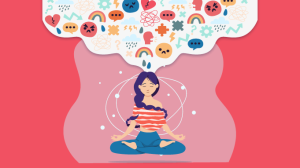Understanding Mental Health Awareness: Breaking the Stigma and Promoting Well-being
Introduction
In today’s fast-paced world, mental health has become an increasingly important topic of discussion. While physical health has always been a prominent concern, the recognition of mental health and its impact on overall well-being has gained significant momentum. One of the key pillars of addressing mental health issues is creating awareness. In this article, we delve into the concept of mental health awareness, its significance, and how it can contribute to breaking the stigma surrounding mental health.
What is Mental Health Awareness?
Mental health awareness encompasses efforts to increase knowledge and understanding of mental health issues, including the recognition of various mental illnesses, their symptoms, and the available resources for treatment and support. It involves promoting open dialogue about mental health and encouraging individuals to seek help when needed.
The Significance of Mental Health Awareness
Awareness about mental health is crucial for several reasons. First and foremost, it helps combat the stigma associated with mental illnesses. Unfortunately, mental health conditions have long been misunderstood and stigmatized, leading to discrimination and prejudice. By promoting awareness, we can challenge these misconceptions and foster a more inclusive and empathetic society.
Furthermore, mental health awareness plays a vital role in early intervention and prevention. When individuals are aware of the signs and symptoms of mental health issues, they are better equipped to identify them in themselves and others. Early detection allows for timely intervention, reducing the severity and impact of mental health challenges.

Promoting Mental Health Awareness
Education and Information Dissemination
Education is the cornerstone of mental health awareness. Through targeted campaigns, workshops, and educational materials, accurate information about mental health can be disseminated to the general public. These efforts aim to debunk myths, challenge stereotypes, and increase understanding about various mental health conditions.
Media Representation
The media plays a powerful role in shaping public perception and attitudes towards mental health. Responsible media representation can significantly contribute to breaking the stigma surrounding mental illnesses. Accurate and sensitive portrayals of individuals with mental health conditions in movies, TV shows, and news articles can help normalize these experiences and encourage empathy and support.
Supportive Communities and Advocacy
Creating supportive communities is vital for mental health awareness. Support groups, both in-person and online, provide individuals with a safe space to share their experiences and seek guidance. Additionally, advocacy organizations play a crucial role in raising awareness, influencing policies, and pushing for greater access to mental health services.
The Impact of Mental Health Awareness
Mental health awareness has a transformative impact on individuals, communities, and society as a whole. By fostering understanding and empathy, it encourages early intervention and promotes help-seeking behaviors. When people feel comfortable discussing mental health, they are more likely to seek the necessary support, leading to improved outcomes and quality of life.
Furthermore, increased awareness can lead to policy changes that prioritize mental health services. Governments and organizations are more likely to allocate resources and develop comprehensive mental health programs when the need is widely recognized and acknowledged.
The Global Movement
In recent years, mental health awareness has gained global attention. Recognizing the need for action, various international campaigns and initiatives have been launched to address the mental health crisis. World Mental Health Day, observed annually on October 10th, serves as a reminder of the importance of mental well-being and encourages individuals and communities to engage in activities that promote mental health awareness.
Conclusion
Mental health awareness is a powerful tool in breaking the stigma surrounding mental health and promoting overall well-being. By increasing knowledge, challenging misconceptions, and fostering supportive communities, mental health awareness paves the way for early intervention, improved access to services, and a more empathetic society.
As individuals, we can contribute to mental health awareness by educating ourselves about mental health, engaging in open conversations, and supporting those who may be struggling. By challenging stereotypes and showing compassion, we can create an environment where seeking help for mental health issues is encouraged and supported.
It is also essential for governments, healthcare providers, and organizations to prioritize mental health. Policies and programs should be developed to ensure accessible and affordable mental health services for all. Funding should be allocated to research, prevention, and intervention initiatives. By investing in mental health, we invest in the well-being and productivity of individuals and society as a whole. https://inclusivementalhealth.org/mental-health-victoria/

In conclusion, mental health awareness is a crucial step toward breaking the stigma and promoting well-being. It involves educating ourselves and others, challenging misconceptions, and creating supportive communities. By working together, we can foster a society that values mental health, supports those who are struggling, and ensures that mental health services are accessible to all. Let us embrace mental health awareness and contribute to a world where everyone can thrive mentally, emotionally, and socially.

